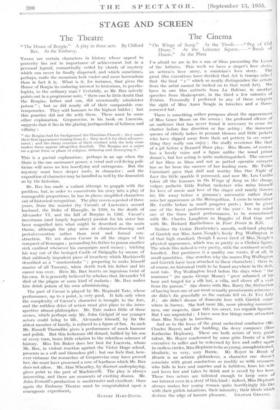The Cinema
" On Wings of Song." At the Tivoli.--" Peg of Old Drury." At the Leicester Square.—" Break of Hearts." At the Plaza I'm afraid we are in for a run of films presenting the Loves of the Artistes. This week we have a singer'S love story, an actress's love story, a musician's love story. The great film executives have decided that Art is trumps (alas.! that the final " e " which so neatly distinguisheS the artiste from the artist cannot be tacked on to that word Art). We have in one film extracts from La Boheme, in another speeches from Shakespeare, in the third a feW minutes of Tristan. Personally I preferred to any of • these snippets the sight of Miss Anna Neaglc in breeches and a three- cornered hat. .
. There is something rather pompous about the appearances of Miss Grace Moore on the screen : the profound silence of an audience that has never found it necessary to cease its chatter before fine direction or fine acting ; the immense queues of elderly ladies in peasant blouses and little jackets who have slipped away from their art pottery to see, some- thing they really can enjoy ; the stuffy reverence like that of a pit before a Bernard Shaw play. Miss Moore, of course, has a lovely voice and a figure unlike the 'usual prima donna's, but her acting is quite undistinguished. The success of her films as films and not as potted operatic extracts has so far been the • success of her leading men. Mr. Tullio Carminati gave that dull and worthy film One- .Night of Love the little sparkle it possessed, and now Mr. Leo Carillo takes all the honours in On Wings of Song as ,the cheap, vulgar, pathetic little Italian racketeer who sums himself for love of music and love of the singer and nearly, throws his life away before a gunman's automatic rather than miss her appearance at the Metropolitan. I seem to remember Mr. Carillo before in small gangster parts ; here he gives one of the finest 'performances of the year : , to my mind one of the three finest performances, to be remembered with Mr. Charles Laughton as Ruggles of .Red Gap and with Mr. Richard Barthelmess in Four Honrs,,toKill.
Neither Sir Cedric Hardwicke's smooth,, well-bred playing of Garrick nor Miss Anna beagle's lively Peg Woffington is of that high standard, though I never tired of Miis,Neagle's physical appearance, which was as pretty as a Chelsea figure, The whole film indeed is very pretty, with the sentiment neatly handled. But prettiness is .a quality one wants, if at all, in small quantities. One wonders why the names Peg Woffington and GarrielC have been attached to these characters; there is, of course, no historical truth to be found anywhere in the deft, neat tale. Peg. Woffington lived before the days, when the mummer " (to quote George Moore) " grew ashamed of his hose and longed for a silk hat, a villa, and above all a N jSit from the parson." She shares with Mrs. Barry, the dist int.( ion of having been one of our most sexually promiscuouS aet re,;ses ; she didn't die gracefully as. the curtain fell on As l'o;o: Like ; she didn't dream of domestic love with Garriel: some- where in 'Surrey. She had more life, more pleasing common- ness, one suspects, than this too sweet, too roguish figurine. But I am ungrateful : I have seen feW things more attractive than Miss Neaglc in breeches.
And so to the loves of the great orchestral conductor (Mr. CharleS Boyer) and the • budding, the dewy composer (Miss Katherine Hepburn). These are both actors of very great ' talent, Mr. Boyer condemned by some grim Dante of a film executive to suffer and be redeemed by love and suffer again in endless circles, Miss Hepburn to be so young, unsophisticated, idealistic, so very, very Barrie. Mr. Boyer in • Break of Hearts is an artistic philanderer, a character one doesn't associate with great conductors so readily as' with - crooners, who falls in love and marries and is faithless, loses his wife and loves her and takes to drink and is saved by her love. These two actors arc talented enough to keep some of our interest even in a' story Of this kind : indeed, Miss Hepburn always makes her young women 'quite horrifyingly life-like with their girlish intuitions, their intensity, their ideals which destroy the edge of human pleasure. GRAHAM GREENE.






































 Previous page
Previous page